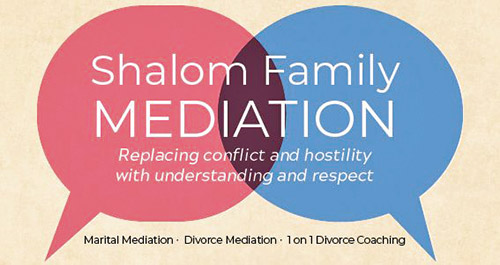

It’s an oft-told tale: someone who’s lost their job decides to view the occasion as an opportunity and pivots their career to focus on their true passion.
What makes Betzalel Rothstein’s experience so unique is that his passion, and now his profession, will serve to reduce tensions in Jewish families, improve children’s prospects and aid people facing some of their toughest challenges.
Betzalel had been working successfully as a sales engineer for a firm that sold internet service when COVID-19 pulled the rug from under the company. He was furloughed in the spring and at first he was not sure what to do next. Then he decided to act on some hard-earned experience and refocus his career to do what he’d already been doing, informally, for years.
Starting in October, he took a 12-week course offered by the Center for Divorce Mediation in New York City to learn the values and best practices of marital and divorce mediation. The course was taught by Dr. Kenneth Neumann and Steven Abel, two “life-time achievers” recognized by the Academy of Professional Family Mediators.
The course attracted participants from across the New York area and combined considerable reading assignments on mediation with class discussions and role-play mediation with the instructors on Zoom. At the end of the course, in December, Betzalel received a certificate attesting that he had completed training in family mediation.
Betzalel, though, was by no means new to the merits of mediation. He had been through a contentious divorce years earlier, despite his efforts to reach an equitable situation. “Because of my divorce, I understand in a very real way how hard it is to get divorced and the difficult challenges to move on,” he said.
Seeing firsthand the shortcomings of the divorce process, he began networking with others with similar experiences in the summer of 2018 and his story was featured in an article in Mishpocha Magazine in February 2019, which led others to reach out to him for advice and support.
In December 2018 he formed a support group, Jews for Equal Shared Parenting. The group, which now has 75 members, initially met monthly in person but now convenes monthly via Zoom. He explained that much of the group’s activity takes place via a WhatsApp group he moderates, with frequent conversations, lots of back and forth and support from peers offered to group members struggling with the divorce process and its aftermath. The WhatsApp group is active on a daily basis and Betzalel shares an inspirational message on it each day.
Drawing on his experiences with the support group, his service as head of the New Jersey chapter of the National Parents Organization (which advocates at the state level for modifications to family law standards for child custody) and his training in the fall class, Betzalel’s next step became clear. In late December he opened his own practice, Shalom Family Mediation.
Shalom Family Mediation offers clients experiencing marital distress three types of services. Marital mediation helps couples identify and address “shalom bayis issues” and better understand and resolve conflicts in the marriage. Divorce mediation enables couples to avoid the steep expenses and acrimony of litigation and come to a fair and balanced settlement as they dissolve their marriage. Divorce coaching is for an individual, because not every couple is appropriate for or open to mediation. This service helps the marital partner navigate the divorce process less contentiously and with more support.
As Betzalel explained, “The goal of mediation is to break the cycle of hurt and hostility, and create a cycle of understanding and respect. It is not easy but with work, it definitely can be done, and by doing so, it creates better and more honest communications.” The goal, he says, is to remove the emotional charges and allow the couple to get to the underlying issues.
Though his practice is quite new, Betzalel already has two clients and looks forward to helping others as well in the years ahead. He said that he sees one of the central missions of his work as serving as an advocate of the children in contentious marriages or divorce situations, because these circumstances can hurt the kids far worse.
Betzalel has since remarried and he and his wife, Chana, who live in Highland Park and attend Agudath Israel, have a blended family of eight children. Chana is tremendously supportive of his work, describing it as “a zechus to all involved, which is truly saving people’s lives.”
People who know Betzalel are quite confident in the prospects for Shalom Family Mediation. Yoel Ackerman, a member of the support group, stated: “Betzalel changed the way that I look at my divorce.” Lenny Levy, another member of the support group, said: “Betzalel showed me how to de-escalate conflict in my divorce and the tremendous benefits that would follow.” Mrs G., a current client, remarked: “Mediation has improved communication between me and my husband better than therapy ever did.”
Betzalel’s approach also received a glowing endorsement from a seasoned local attorney, who’s seen the limits of divorce litigation.
“It’s always in the client’s best interest, if they can, to use mediation,” said David Tawil, a marriage and family law attorney with the law firm of Lindabury, McCormick, Estabrook, & Cooper, P.C. in Westfield. “The judicial process is very slow, cumbersome and extremely backed up. Secular judges, from vastly different backgrounds, often don’t understand the values and sensitivities of religious clients. Mediation is designed to take those factors into account.”
To learn more about Shalom Family Mediation, visit their website at www.shalomfamilymediation.com.
By Harry Glazer













